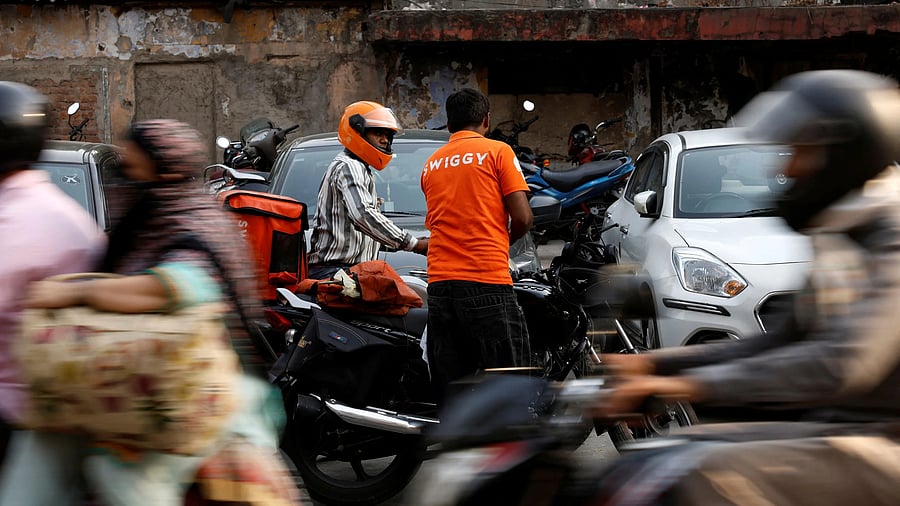
A representative image of gig workers.
Credit: Reuters Photo
New Delhi: The newly notified labour codes represent a transformative and historic reform for India's gig economy, finally bringing this vast segment of workers under formal regulatory recognition and social security.
For the delivery partner dropping off groceries or the driver navigating city traffic, this move signals the end of legal invisibility, transitioning them from the fringes of the "unorganised" sector into a formal social security net.
The introduction of uniform employment rights, mandatory appointment letters, and access to benefits such as provident funds, ESIC, and insurance has laid a new foundation for stability and predictability for millions of gig and platform workers across India, experts say.
However, the implementation poses operational challenges owing to the fluid and varied nature of gig work, requiring robust compliance mechanisms and behavioural adaptations from both platform companies and workers.
"For the first time, this rapidly expanding segment of the workforce, traditionally excluded from the conventional employer-employee relationship, gains legislative recognition and a foundational layer of social security,” Preetha S, Partner, JSA Advocates & Solicitors, said.
This shift presents both a significant opportunity to enhance worker protection and a new dimension of compliance responsibility for platform companies operating in India, compelling them to contribute to the social welfare of their associated workforce, she said.
Major players in the gig economy have welcomed the move, signalling a readiness to adapt to the new regulatory landscape.
"We welcome the government's intent to implement labour reforms, and we are evaluating the changes that have to be ushered in," an Amazon India spokesperson said.
"We welcome this progressive step that recognises how India's work ecosystem has evolved. Strengthening social security for gig and platform workers is vital for long-term resilience and inclusion," a Rapido spokesperson said.
In a regulatory filing, Eternal, the parent entity of Zomato and Blinkit, said the labour codes will help strengthen social security access for gig workers, and that it does not think the financial impact of these rules will be detrimental to the long-term health and sustainability of its business.
"For Zepto, this means stronger social security for our delivery partners, without losing the flexibility that powers quick commerce," a Zepto spokesperson said, adding that the codes bring clarity and protect workers while supporting ease of doing business.
In 2020-21, 77 lakh workers were engaged in the gig economy. The gig workforce is expected to expand to 2.35 crore workers by 2029-30, according to NITI Aayog. According to TeamLease Services, India's current gig workforce is around one crore.
"For years, the country's gig workers subsidised its growth from the margins. Today, they step into the system. This reform has liberated labour to a large extent. This creates flexibility for entrepreneurs and safety for workers. The country is finally playing catch-up with the future," TeamLease Regtech CEO Rishi Agrawal said.
According to Puneet Gupta, Partner, People Advisory Services-Tax, EY India, the new codes bring clarity, digitisation, and consistency across compliance requirements.
"For workers, the impact is significant; formal employees gain stronger protections and uniform benefits, while gig and platform workers are included in social security schemes for the first time. This transformation will reshape compensation structures, HR policies, and employment models, creating a more inclusive and future-ready labour ecosystem,” Gupta said.
However, industry veterans caution that harmonising the inherent volatility of the gig economy with the rigid structures of formal labour laws will be the real test of the new regime.
Gig assignments shift in duration, hours, and income sources, making documentation and the continuity of benefits harder to pin down.
"The real test will be fitting a steady employment framework into a world where work is fluid. There will also be variation in how employers read their obligations. Some will adapt quickly, while others will need support on compliance and record-keeping. Workers will need simple, direct communication so they understand their rights and the value of a safety net.
"These are manageable challenges. With clear rules, stronger digital rails and steady enforcement, the transition can work. The direction of the codes is sound, but the ecosystem will need discipline and cooperation to make it real,” said Kartik Narayan, CEO of jobs marketplace Apna.
Lohit Bhatia, President of India & Global Operations at Quess Corp, said, "Ensuring real-time compliance, benefit contributions, and grievance resolution at scale in a highly mobile workforce will require strong systems and behavioural change from workers and partners.
"However, with simplified compliance, national licensing, and unified registers, the codes also remove many previous bottlenecks and create a more modern, digital-first environment. This is exactly the kind of regulatory foundation that will help gig work grow responsibly,” Bhatia said.